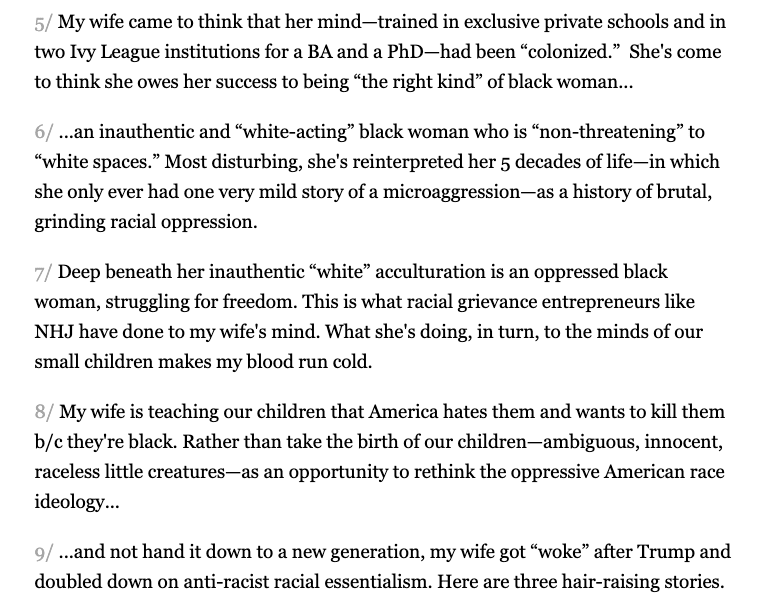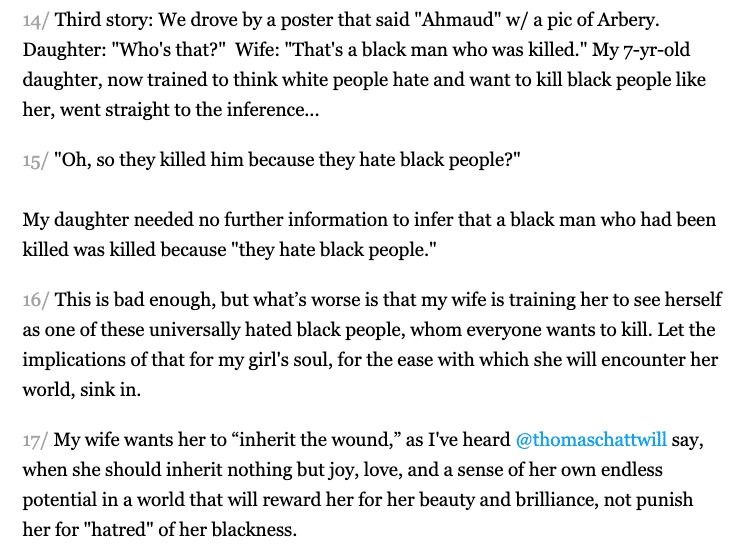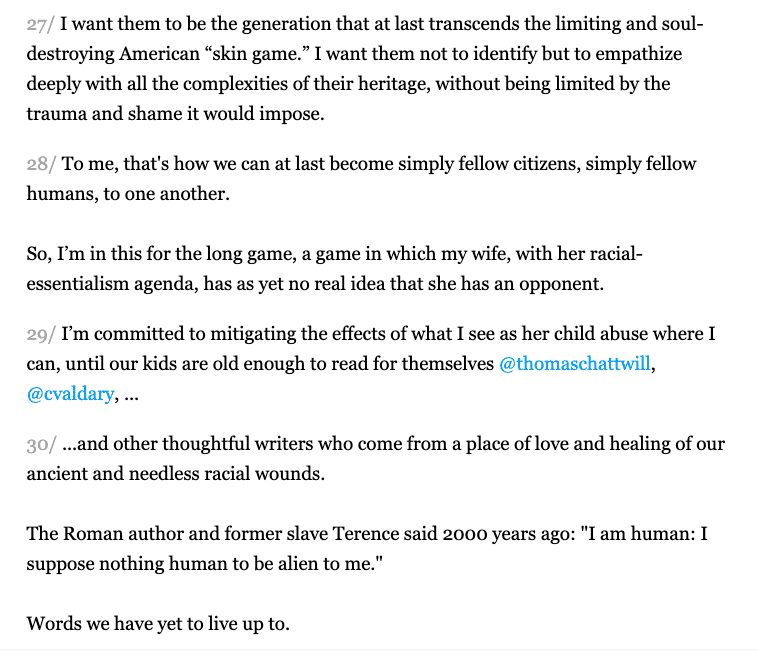‘Antiracism’ Destroying A Family

This is both sad and infuriating. It’s from an anonymous academic who posted it on Twitter as @publicola17:







A few things.
- I think the fact that this black woman graduated from Ivy League schools has a lot to do with this. There may be a lot of class insecurity in her — guilt that as an Ivy graduate, she is one of the most fortunate people on the planet, and according to her husband, has lived “a life of untroubled privilege” — and she is displacing it by adopting this phony racialist identity.
- It says something bizarre and twisted about our time and place that a person like this feels whole not through the incredible story of black endurance and achievement in America, but by adopting an identity of persecution and irredeemable suffering.
- I know someone (a white person) who grew up poor, and who, as an adult, cannot accept the fact that she is accomplished and well-liked. Most people who know her have no idea about her childhood, but she is convinced that everybody secretly thinks she doesn’t belong, and are judging her. This is the furthest thing from the truth, but when I lived around her, this feeling of self-hatred and anxiety consumed her. All her stories eventually led back to her own victimization, and she perseverated on stories of other people’s victimization, because those tales told her How The World Really Is. Being in her social circle taught me that there are some people who don’t really want to be healed. Nothing anybody could do for her could change the narrative she carried with her — a narrative of rejection and persecution. The trauma-narrative was the only authentic self-narrative available to her. It was really impossible to have a serious conversation with her about any of this, because if her friends challenged the narrative in any way, she would accuse us of denying or at least downplaying her suffering. I wonder if something like that is going on here.
- This is a particularly vicious — and, now, valorized — example of “inheriting the wound,” but there are other ones. It’s a very human trait: defining yourself by some grievance suffered by ancestors. It’s about knowing who you are by who your people hate. Most of the time I can’t stand the way we Americans are so ahistorical, but there are also times when it is a blessing. Imagine the American children of a Belfast-born Catholic immigrant and a Belfast-born Protestant immigrant, getting to know each other without carrying the weight of their ancestors’ past. Isn’t that in some sense the kind of society we want? One in which people are judged not by the color of their skin, or their ethnic heritage, or anything other than the content of their character?
- Actually, it’s not at all what identity-politics leftists want. They want to bring the pathology that is tearing this man Publicola’s family up to all of society. This is what Marxist theory does: compel one to judge everyone else solely in terms of external identity characteristics, and how it relates to power differentials. These leftists promise nothing but constant conflict and division. There is no way ever to reach a livable state of justice; it is always relentless calling out of others for their supposed bigotries.
- Can you imagine how cruel it is to fill these children of hers with fear and hatred? Does it make her feel alive? Think of all the people who came before her who suffered and fought so that she and her children could live in a world in which they would not have to carry that burden. And now she’s taking it on herself, and forcing it onto her kids. If this continues, and they believe their mother, she’s going to teach them to sabotage themselves.
- And to hate their father for the color of his skin.
- There’s a great French phrase — nostalgie de la boue — which means, literally, “nostalgia for the mud.” It’s a phrase to describe the desire for degradation and depravity. What this man’s wife is undergoing now is a form of this, I think. You might call it nostalgie de la plaie (nostalgia for the wound), but the boue is probably more psychologically truthful. This poor woman never knew the degradation of Jim Crow — but is now seized with the desire for it, so much so that she is wrecking her family over it.
- This is what the identity-politics left is going to bring to all of society: ruin, hatred, endless suspicion. We all want, or should want, to live in peace. If there has been injustice, then it must be rectified, insofar as it can be, so that we can live in peace. But perfect justice is not possible in this life. Nevertheless, we must find a way to love each other, and bear each other’s sins and failings, or commit ourselves to forever war. “You must love your crooked neighbour/With your crooked heart,” wrote the poet W.H. Auden. Identity-politics leftism is about blaming the Other for the deformations in your own heart, and refusing to be healed because you are afraid of who you would be if you were well.
- One of the strangest stories in the Gospel is when Jesus frees a demoniac by casting the evil spirits out of him, and sending them into a herd of swine (Mark 5). Mark writes: “When they came to Jesus, they saw the man who had been possessed by the legion of demons, sitting there, dressed and in his right mind; and they were afraid. Those who had seen it told the people what had happened to the demon-possessed man—and told about the pigs as well. Then the people began to plead with Jesus to leave their region.” You see what happened? This man, Jesus, had just freed a poor soul who had been living chained up in the graveyard, tormented constantly by demons. And when the people of that village saw the miracle Jesus had worked — this suffering man, restored to himself — they were afraid, and told Jesus to get out of town!
- Why are we so afraid to live in peace with our neighbor? Why are we so fearful of being made whole? Why does hate make us feel more vital than love? Why is this man’s wife choosing to leave her family and chain herself in the graveyard, where “night and day among the tombs and in the hills she will cry out and cut herself with stones”? I mean, it is one thing if you were raised in great suffering, and cannot escape its psychic wounds, absent grace. But to choose to take that pointless suffering on — a suffering that does not lead to greater good, only suffering for its own masochistic sake? Is this not like that bizarre woman who put drain cleaner in her eyes to make herself blind, or one of those people with body dysmorphic disorder who say they will not be okay until they have a body part chopped off?
UPDATE: Some of you believe that the Publicola narrative is fake. You might be right. It resonated with me because, as I’ve said, I’ve known people in marriages like that. In one case, it was a man whose wife had an intense religious conversion that nearly wrecked the marriage (and might ultimately have done — I lost touch with him ages ago), and in another case, it was a matter of class: upper middle class husband, working class wife, and when their marriage ran into ordinary trouble, her anxiety made her flip to a script from childhood, in which her husband was, like all rich people, a hateful snob who looked down his nose on people like her, etc. It was tearing him up inside.
Ultimately whether or not Publicola’s narrative is literally true, or some sort of drama, the issues it brings out are real, and by no means restricted to race. Readers of my book The Little Way of Ruthie Leming will remember that class anxiety and resentment against me for having moved away to the city and gotten above myself threatened to sabotage my return to my family back in Louisiana. I had no idea that this was there, because it had been buried under Southern politeness. After I got home, my late sister’s oldest child, then 19, revealed to me that her younger sisters would never accept me and my wife, because their sainted mother, along with their grandfather (my dad), had taught them that we were city people, and therefore bad.
That devastated me. I mean, devastated me. I had just said goodbye to my East Coast career and life to move with my wife and kids to a tiny Southern town to be closer to family and to help, and now the truth was out. I confronted my father about it, and he did a poor job of denying it. I ended the book by saying that I hoped it could be overcome with time. It wasn’t, though. I don’t want to talk about it further in this space, but I just wanted to bring up what has already been made public in my work to say that I have a deep, deep feeling about stories in which human relations, especially family relationships, are abrogated by an ideological narrative — about class, about race, about anything. It was impossible for me to overcome the power of that class narrative within my own family. It was all-powerful. And it wrecked something beautiful.
Even if the anonymous man Publicola’s narrative is nothing but an exercise in creative writing, it still tells a truth.
Subscribe for as little as $5/mo to start commenting on Rod’s blog.